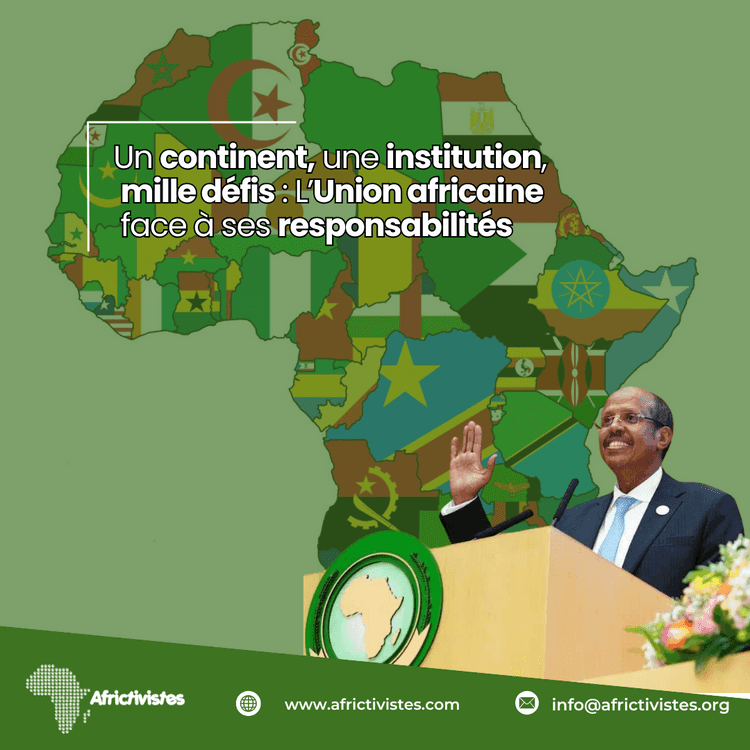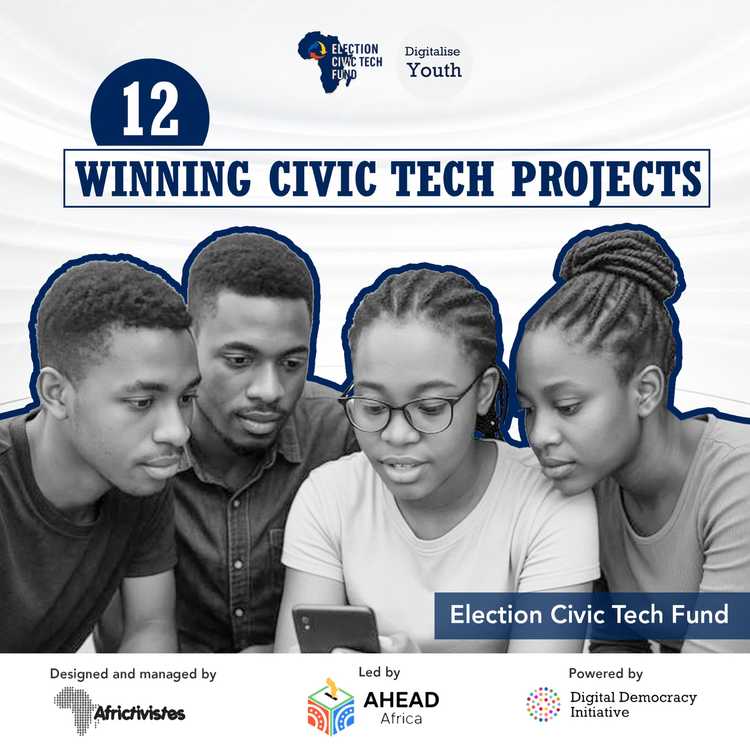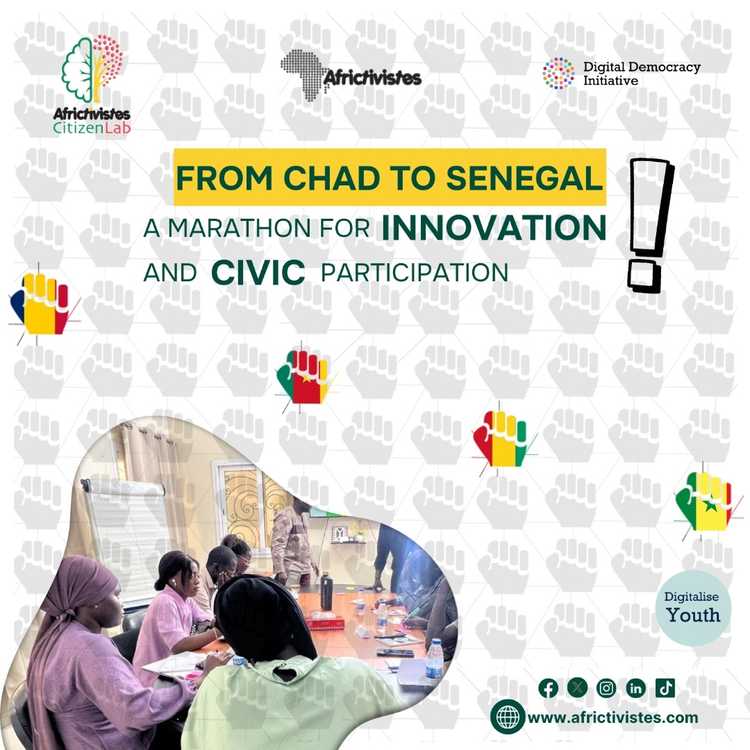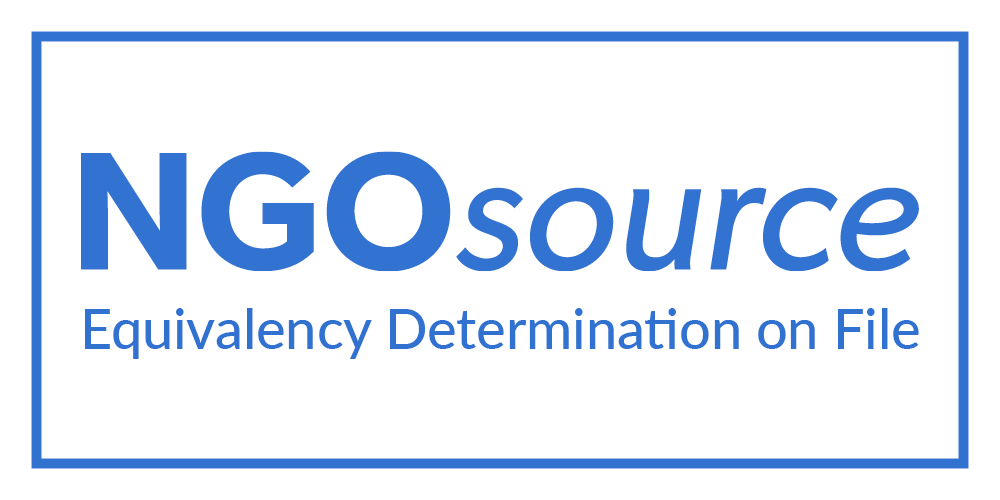A Continent, An Institution, A Thousand Challenges: The African Union Facing Its Duties
During the 38th summit of African Union (AU) heads of state and government in Addis Ababa on 15 February, Mahamoud Ali Youssouf, Foreign Minister of Djibouti, was elected president of the AU Commission. In a tight race against Raila Odinga of Kenya and Richard Randriamandrato of Madagascar, he secured a two-thirds majority of the votes from the 49 eligible member states, as six countries under sanctions were excluded from voting. We congratulate the newly elected president and remind him that his election comes at a critical time for a continent facing numerous and complex security, peace, and democracy challenges.
Security Challenges: An Absolute Priority
The Crisis in Eastern Democratic Republic of the Congo (DRC)
The war in Eastern DRC, marked by the resurgence of conflict and the return of the March 23 Movement (M23), is one of the most urgent issues. Since 27 January, M23 rebels have controlled the city of Goma. This resumption of fighting in the North Kivu capital has resulted in over 3,000 deaths and 2,000 serious injuries according to the UN up to mid-February. Medical infrastructures are overwhelmed, and Goma airport has remained closed since M23’s entry, crippling humanitarian aid. More than three weeks after losing Goma, Bukavu, the capital of South Kivu, has now fallen into the hands of the rebels.
The capture of Bukavu prompted a response from the Ugandan army chief, Muhoozi Kainerugaba, son of President Yoweri Museveni, who announced the deployment of troops to “secure the Ugandan territories bordering the city of Bunia (Ituri province in northeastern DRC) and vulnerable communities.”
There is also military presence from several countries, including Burundi, Uganda, and South Africa alongside the Armed Forces of the Democratic Republic of the Congo (FARDC). Meanwhile, Rwanda faces accusations from several observers of actively supporting the M23 rebels under Paul Kagame’s regime. Alongside these soldiers, the same observers highlight the presence of various armed groups with diverse interests. Meanwhile, the United Nations Stabilization Mission in the Democratic Republic of the Congo (MONUSCO), present for 26 years, struggles to fulfil its primary mission of protecting civilians.
On Friday, 14 February 2025, in the lead-up to the 38th AU summit, the AU Peace and Security Council meeting was dedicated to this war. Unfortunately, it led nowhere. Even though at the end of the meeting, the outgoing Commission President, Chadian Moussa Faki Mahamat, called for a ” ceasefire, respect for the territorial integrity of the DRC, the resumption of direct dialogue between all parties, and the merging of the Luanda and Nairobi processes.”
A Prolonged Civil War in Sudan
The crisis in Sudan, described by UN experts as one of the most devastating globally, demands urgent intervention. Since 15 April 2023, fighting between armed forces led by General Abdel Fattah al-Burhan, head of the military junta, and Mohamed Hamdan Dogolo, head of the Rapid Support Forces (RSF), has resulted in over 18,000 civilian deaths. Out of a population of fifty million, three million have fled, with nine million displaced internally. The AU must prevent the conflict from spreading and work towards inclusive mediation in South Sudan, already weakened by years of civil war and severe poverty among part of its population.
In such a critical context, it is imperative that the AU, still under the leadership of Mahamoud Ali Youssouf, fully assume its role as an impartial mediator and facilitator. After all the failures thus far on this issue, it must strive to establish an inclusive and constructive dialogue that brings together all stakeholders.
This conflict, which has destabilised the Horn of Africa for over two years, cannot be resolved without a collective approach based on principles of justice, transparency, and respect for human rights. The AU thus has a historic opportunity to reaffirm its role in crisis prevention and resolution while strengthening citizens’ trust in the continental institution.
A Geopolitical Imbalance in the Sahel
In Burkina Faso, Mali, and Niger, the military juntas in power have formed the Alliance of Sahel States (AES) and formally left the Economic Community of West African States (ECOWAS) on 29 January 2025. To combat jihadist groups, these countries are now relying on Africa Corps (ex Wagner Group), a Russian security company. This new collaboration follows the rupture of defence agreements with the former colonial power, France.
While criticised by some, the presence and active interference of Russian mercenaries in defence and security policy is a factor that the new AU Commission must integrate into its roadmap. This should aim to strengthen regional and sub-regional dynamics, as well as values of peace, social cohesion, inclusion, independence, and sovereignty.
In light of these three contexts, it is evident that conflicts in Africa are taking on unprecedented geographical proportions and that peace restoration mechanisms are showing their limits. For instance, initiatives like the AU’s “Silencing the Guns,” launched in 2013, and sub-regional mediation attempts have yet to achieve their goals. The Political Affairs, Peace and Security Commission, as well as the African Commission on Human and Peoples’ Rights, must be strengthened to better respond to crises.
Democratic Regression: Another battlefield
From 2020 to 2023, Africa experienced ten coups d’état and several unconstitutional changes of power. Although the super electoral year of 2024 was marked by democratic and generational alterations, for example in Senegal and Botswana, it also consolidated authoritarian regimes in Tunisia and Rwanda.
In other countries, such as Mozambique, Comoros, and Mauritania, elections were followed by violence and repression, resulting in hundreds of deaths and violations of fundamental freedoms. AfricTivistes, concerned with respect for human rights, has documented all these cases.
In 2025, more than ten African countries will hold elections. The new leading team of the AU is invited to commend the Gabonese transitional authorities’ initiative and assist them in adhering to the electoral calendar they have set for the upcoming presidential election on 12 April 2025.
In this same perspective, it must remind the military juntas in West Africa of the urgency of organising elections in accordance with the electoral calendars of various transition charters for a return to constitutional order, in line with paragraph 4 of Article 25 of the African Charter on Democracy, Elections and Governance (ACDEG).
Particular attention must also be paid to Cameroon and Côte d’Ivoire, which are heading towards particularly tense electoral contests, given the political, economic, and security stakes involved. The complexity of these electoral deadlines for both countries lies less in rivalries among political actors than in the intentions of the outgoing presidents to retain and monopolise power.
In light of these situations signalling political crisis and institutional instability, the AU must strengthen regional democratic governance mechanisms. It must also work to update its main instruments for promoting democracy, notably the ACDEG, as well as its various conventions and protocols for the defence of human rights and fundamental freedoms.
The Necessity of Openness for an Inclusive Approach
The new president of the Commission must integrate African civil societies and stakeholders into his approach. Many are implementing projects to strengthen and consolidate democratic gains through civic technologies and community dynamics.
In this regard, AfricTivistes has deployed several programs for the promotion of citizen participation and civic engagement for over ten years. In this same vein, the pan-African network has piloted learning and capacity-building frameworks, providing many actors with the opportunity to understand and appropriate continental mechanisms like the ACDEG and other instruments.
All these spaces for exchange and collaboration have also fostered inclusive dialogue among citizens, civil society organisations, and African Union institutions. These years of experience have enabled the organisation to be part of several African and international consortiums to address areas such as technological innovation for democracy, citizen participation, and access to information.
These issues are driven by collective dynamics, as the threats to democratic processes require a multi-stakeholder approach (citizen movements, grassroots community organisations, activists, civil society actors, media professionals, regional and sub-regional institutions).
The AU’s strengths: there is still hope
In addition to the aforementioned priorities, other challenges awaiting this new team reflect the issues facing Africa today: strengthening representation on the international stage, accelerating economic integration, combating corruption, promoting good governance, responding to environmental and climate challenges, and promoting political participation among youth and women.
Furthermore, as major powers engage in a frantic race towards Artificial Intelligence (AI) and emerging technologies, Africa must urgently define a strategy to ensure its technological and digital sovereignty. This involves developing resilient infrastructures, promoting innovation through dynamic ecosystems, and training and enhancing digital skills to enable Africans to fully seize the opportunities offered by the digital economy.
Despite its structural weaknesses, insufficient funding, internal divisions, and rivalries with regional blocs, the AU has solid strengths. Its pan-African legacy and historical role in the struggle for independence of certain African nations grant it unique legitimacy. It remains an essential space for dialogue and cooperation to tackle common challenges.
Moreover, the adoption of a resolution at this summit classifying slavery, deportation, and colonisation as crimes against humanity and genocide is a significant symbolic advance. In a global context marked by the rise of extremism and populism in the West and parts of the continent, this decision recalls historical truths.
It is also important to highlight the adoption by the Assembly of Heads of State and Government of the African Union Convention on the Elimination of Violence Against Women and Girls. This advancement represents a first step in the commitment of several organisations to put an end to these human rights violations.
Ultimately, Mahamoud Ali Youssouf’s election as head of the AU Commission comes at a decisive turning point for the African continent. The challenges are immense: armed conflicts, humanitarian crises, democratic regression, and institutional weaknesses. However, the institution has opportunities to reinvent itself and strengthen its leadership for a more stable and prosperous Africa.
Abdou Aziz Cissé, Advocacy Officer for Democracy and Governance at AfricTivistes
Contact: abdou.cisse@africtivistes.org



![[Guinea-Bissau]: Joint Statement from Human Rights Defenders Against the Confiscation of Popular Will !](/static/8552596543d1c00bc73e662f85c0a62f/fce2a/Capture-decran-2025-12-01-a-16.34.43.png)
![[Guinée-Bissau] Joint Declaration – Afrikajom Center and AfricTivistes both firmly condemn the military takeover and warn of the risk of a political crisis !](/static/4d5ad12346b3ef8c55278621c445488b/9e635/Putsch-Guinee-2.jpg)

![[Tanzanie] 🇹🇿 AfricTivistes strongly condemns violent suppression in Tanzania](/static/adf91a1c13cd101f988b6b6971928880/9e635/TZN.jpg)
![[Cameroon] AfricTivistes condemns violent repression, urges govt to uphold rights !](/static/6399a9d8e94e3ae1f681f86178520d96/9e635/WhatsApp-Image-2025-10-27-at-15.32.48.jpg)



![[Madagascar] Generation Z, the driving force of civic awakening!](/static/9072e289fdab44c062096dcfb9499441/9e635/4-2.jpg)









